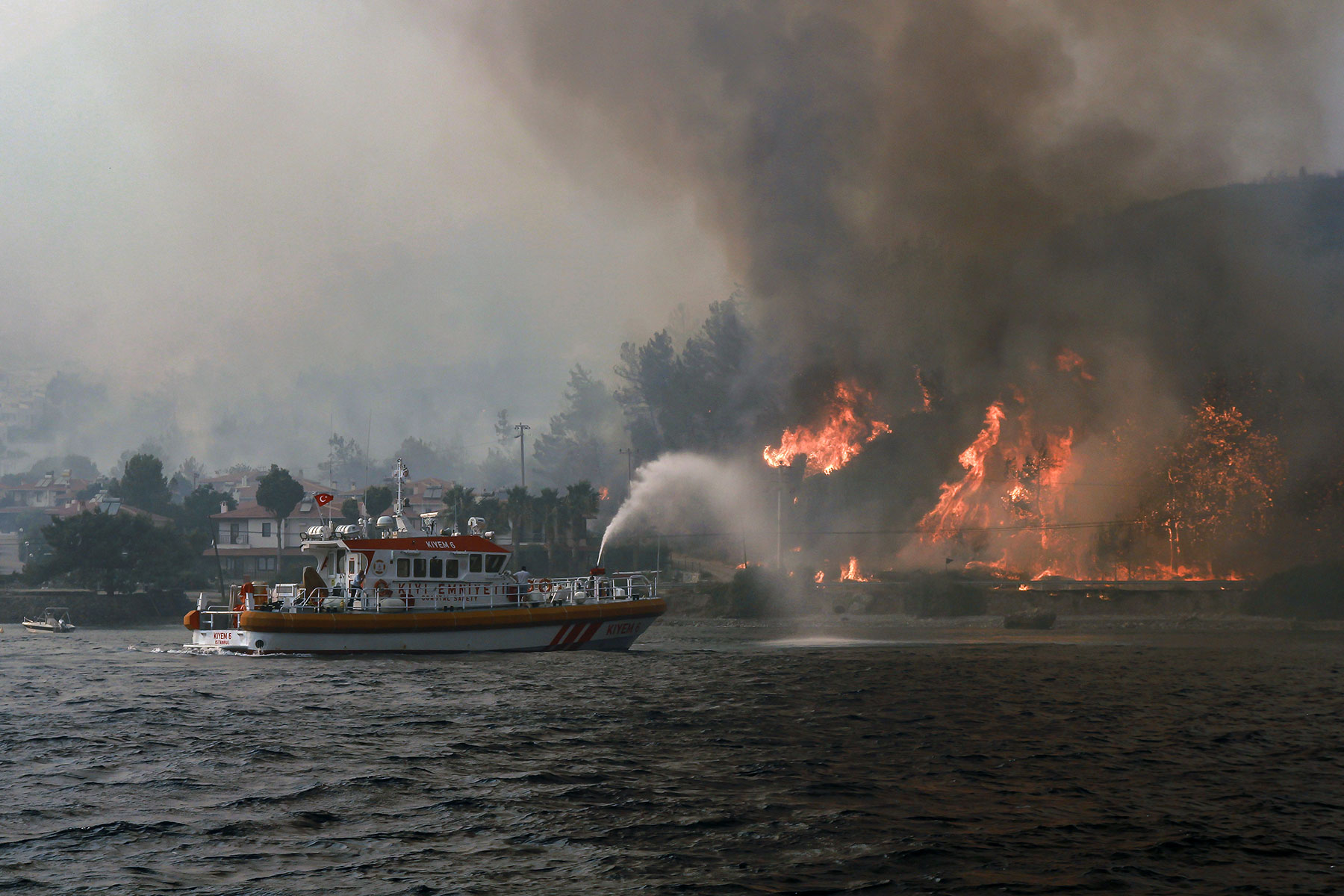Turkey went through a terrible summer from an ecological point of view. The country has been experiencing unprecedented wildfires caused by heatwaves and droughts that have devastated forests in the southwestern part of Anatolia, while floods have been hitting the north and east. The disasters obviously have unprecedented economic and social consequences, all of which are raising concerns about Turkey’s vulnerability to environmental crises and climate change and Ankara’s ability to cope with them.
Addressing Climate Change Impacts on the Sporting Calendar
In 2011, the Turkish authorities, in the National Adaptation Strategy and Action Plan, realized that Turkey’s location in the Mediterranean basin made it more susceptible to arid conditions and heatwaves resulting from climate change, citing the 2007 Fourth Assessment Report of the UN Intergovernmental Panel on Climate Change (IPCC). In its sixth report, published in August this year, the IPPC concludes that climate change is already creating many extreme weather and climate events in all regions of the world and that they are intensifying in an unprecedented way.
Despite these bitter observations, Ankara has long refrained from ratifying the 2015 Paris Agreement. The legally binding international treaty was signed with the central objective of limiting global warming to well below 2 degrees Celsius and continuing efforts to limit it to 1.5 degrees Celsius. But recently, President Recep Tayyip Erdogan declared the country’s intention to ratify the Paris accord before the UN Conference of the Parties (COP26) on climate change, which is to open in Glasgow on October 31.
The mindset of the Turkish government can help to explain its inadequate efforts to address the climate crisis. But to understand this resistance on the part of Ankara, one should look at Turkey’s problematic position in the global climate change regime.
Lack of Domestic Commitment
Climate change has never been a priority for the ruling Justice and Development Party (AKP). Its growth-oriented economic and energy policies of the past 20 years have followed a development model that prioritizes economic gains while ignoring their environmental consequences. Already realized projects such as Istanbul Airport or planned initiatives such as the Istanbul Canal are only a few examples of this vision.
Another is the priority given to the use of coal. It is still the third-largest source of primary energy in Turkey after oil and natural gas, and coal-related emissions have increased by almost 32% over the last decade. Total greenhouse gas emissions increased by 137% between 1990 and 2018, and the government does not currently have a target year for peaking emissions or for reducing emissions in absolute terms.
Moreover, Turkey contends, like many other less-developed countries, that it only has a negligible responsibility for greenhouse gas emissions — and hence should do less than fully industrialized countries, which have a huge historical responsibility for anthropogenic climate change.
Turkey’s Special Circumstances
In 1992, when the United Nations Framework Convention on Climate Change (UNFCCC) was adopted, as a member of the Organization for Economic Cooperation and Development — and without any objection from Turkish officials at that time — Turkey was listed in both Annex I and Annex II of the UNFCCC. These countries, which are generally richer and more developed, are expected to take the lead in combating climate change. But most importantly, Annex II countries should also provide financial support to developing countries that are in the non-Annex I group and have fewer obligations.
Turkey was, therefore, theoretically obliged to reduce its emissions and help developing countries such as Brazil, South Korea and China. As a result of Turkey’s diplomatic efforts, the country was finally removed from Annex II in 2001, but it is still listed in Annex I, which means that Turkey is not obliged to contribute to climate finance, but it cannot benefit from financial support either.
As a consequence, during the Conference of the Parties (COP21) in Paris in 2015, Turkey said it would not sign the agreement if its demand was not taken into account. At the time, German Chancellor Angela Merkel and French President Francois Hollande had to intervene to convince Erdogan to sign the agreement. But before ratifying the Paris Agreement, Ankara wanted to be removed from the list of developed countries of the UNFCCC and receive financial assistance for climate change mitigation. Obviously, Turkey’s behavior carries a cost in the form of ecological costs to the country and the surrounding region as well as negative impacts on the Turkish economy and global efforts against climate change.
Getting Turkey on Board
The effects of climate change will require significant changes in geo-economic policies at the European and global levels. The European Union is already progressively integrating climate factors into its external economic relations, which will change the way it trades with its partner.
The EU’s planned carbon border tax, called the Border Carbon Adjustment Mechanism, would be a significant tool in this strategy and affect Turkey’s trade relations with the EU if Ankara fails to decarbonize its economy. Turkey conducts half of its trade with the EU. Decarbonization would, therefore, also be an economic and strategic requirement for Turkey in terms of its trade and other relations with the EU.
The ratification of the Paris Agreement will be the first positive step toward joining the international coalition to fight climate change, and it should also be seen as part of Turkey’s charm offensive toward the West. This effort will not be complete if Ankara does not make concrete mitigation commitments by submitting a new and more ambitious version of its nationally determined contributions.
It seems that Ankara can be motivated to take such moves and be actively involved in the fight against climate change through financial assistance. The EU can play an important role here. It should effectively use its financial and diplomatic powers to secure these outcomes.
After all, bringing Turkey on board in the global fight against climate change is also in the interest of the EU, which has the leadership role in achieving the objectives of the Paris Agreement. This would not only contribute toward global mitigation efforts, but also increase Turkey’s resilience and preparedness for the ecological crises that will only worsen with climate change.
*[This article was originally published by the German Institute for International and Security Affairs (SWP), which advises the German government and Bundestag on all questions related to foreign and security policy.]
The views expressed in this article are the author’s own and do not necessarily reflect Fair Observer’s editorial policy.
Support Fair Observer
We rely on your support for our independence, diversity and quality.
For more than 10 years, Fair Observer has been free, fair and independent. No billionaire owns us, no advertisers control us. We are a reader-supported nonprofit. Unlike many other publications, we keep our content free for readers regardless of where they live or whether they can afford to pay. We have no paywalls and no ads.
In the post-truth era of fake news, echo chambers and filter bubbles, we publish a plurality of perspectives from around the world. Anyone can publish with us, but everyone goes through a rigorous editorial process. So, you get fact-checked, well-reasoned content instead of noise.
We publish 2,500+ voices from 90+ countries. We also conduct education and training programs
on subjects ranging from digital media and journalism to writing and critical thinking. This
doesn’t come cheap. Servers, editors, trainers and web developers cost
money.
Please consider supporting us on a regular basis as a recurring donor or a
sustaining member.
Will you support FO’s journalism?
We rely on your support for our independence, diversity and quality.







